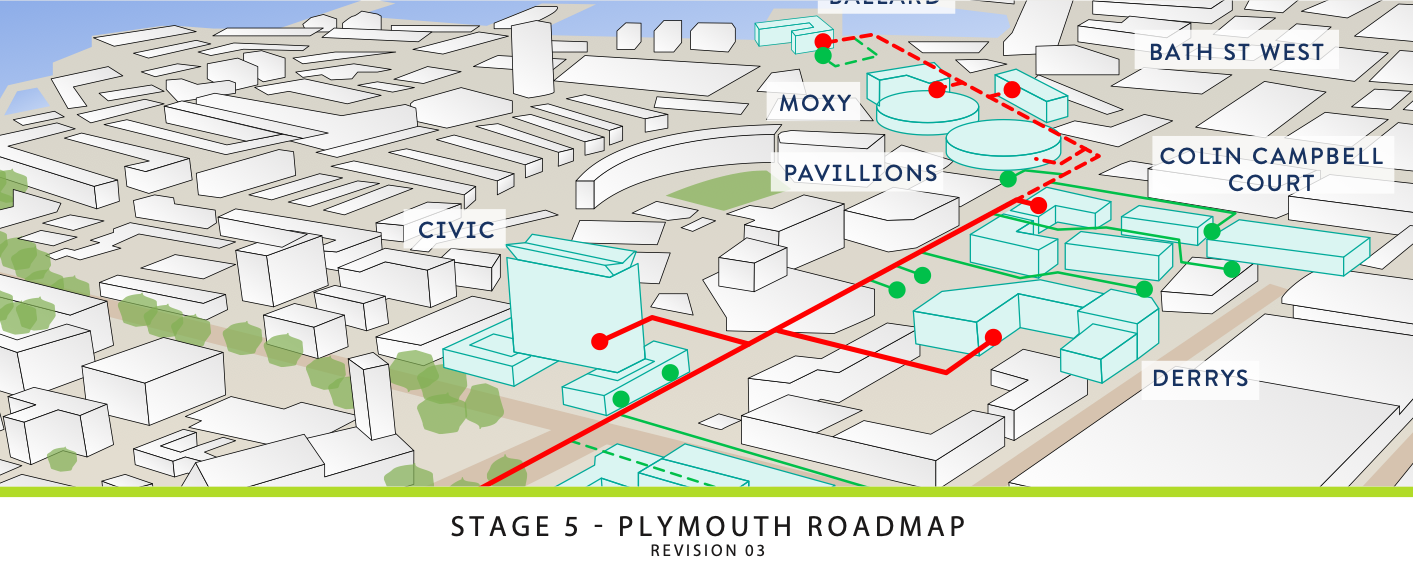England
Ongoing
- Type : Energy planning, Project
- Size : Regional
- Area : Residential, Utility
Environmental benefit
Plymouth 5th generation heating and cooling
Share
England
Ongoing
- Type : Energy planning, Project
- Size : Regional
- Area : Residential, Utility
Environmental benefit
Discover this use case online

Two initial phases of the masterplan are currently being progressed. At the Civic Centre, the proposals are linking with a small existing network between two City Council buildings (Council House and Guildhall), and at Bath Street, where the ambient temperature heat spine is being installed and will serve a new hotel, an existing events arena, and 147 new affordable houses. Over time, these projects will grow and join together.
The scheme will utilise renewable heat from a ‘principal aquifer’ in the underlying limestone across this area of the City via water source heat pumps. The future phases may also link to marine source heat pumps.
The 5th generation approach allows waste heat to be recovered from cooling and used for heating either simultaneously or inter-seasonally.
Over the masterplan area, it is expected that full electrification, through open loop ground source heating across the network, will achieve a 37,000 to 40,000 tonnes saving over 15 years. The higher estimate assumes free cooling can be recovered to the fullest extent from seasonal thermal energy storage in the aquifer and the lower assumes no free cooling is recovered.
The 5th generation approach offers many benefits and will help new developments achieve future compliance with Building Regulations, based on the current revised SAP assumptions, which will favour electrically led solutions.
Expansion from the initial schemes is also being explored, building on the initial work completed through the Plymouth Roadmap, with the feasibility of connecting some larger retail cooling loads and bringing other major developments onto the network.
The 5th Generation approach will only work in areas where there is some cooling proposed, and it is therefore suitable for mixed use urban areas, including office, retail, leisure, hotel, healthcare or retail uses, as well as residential uses.
The initial phases are being developed by Plymouth City Council, who will own and manage the network initially (with contracts let for installation, operation and maintenance), until the network grows to a scale where private investment is required.
 R-ACES has received funding from the European Union’s Horizon 2020 research and innovation programme under grant agreement N° 892429
R-ACES has received funding from the European Union’s Horizon 2020 research and innovation programme under grant agreement N° 892429
Two initial phases of the masterplan are currently being progressed. At the Civic Centre, the proposals are linking with a small existing network between two City Council buildings (Council House and Guildhall), and at Bath Street, where the ambient temperature heat spine is being installed and will serve a new hotel, an existing events arena, and 147 new affordable houses. Over time, these projects will grow and join together.
The scheme will utilise renewable heat from a ‘principal aquifer’ in the underlying limestone across this area of the City via water source heat pumps. The future phases may also link to marine source heat pumps.
The 5th generation approach allows waste heat to be recovered from cooling and used for heating either simultaneously or inter-seasonally.
Over the masterplan area, it is expected that full electrification, through open loop ground source heating across the network, will achieve a 37,000 to 40,000 tonnes saving over 15 years. The higher estimate assumes free cooling can be recovered to the fullest extent from seasonal thermal energy storage in the aquifer and the lower assumes no free cooling is recovered.
The 5th generation approach offers many benefits and will help new developments achieve future compliance with Building Regulations, based on the current revised SAP assumptions, which will favour electrically led solutions.
Expansion from the initial schemes is also being explored, building on the initial work completed through the Plymouth Roadmap, with the feasibility of connecting some larger retail cooling loads and bringing other major developments onto the network.
The 5th Generation approach will only work in areas where there is some cooling proposed, and it is therefore suitable for mixed use urban areas, including office, retail, leisure, hotel, healthcare or retail uses, as well as residential uses.
The initial phases are being developed by Plymouth City Council, who will own and manage the network initially (with contracts let for installation, operation and maintenance), until the network grows to a scale where private investment is required.
